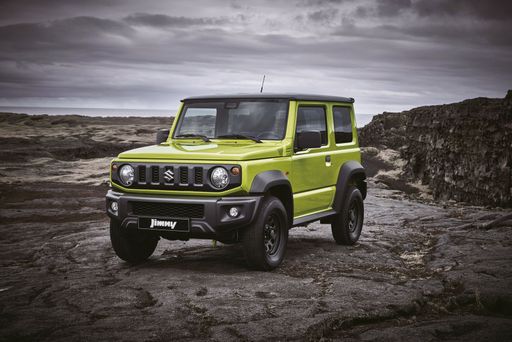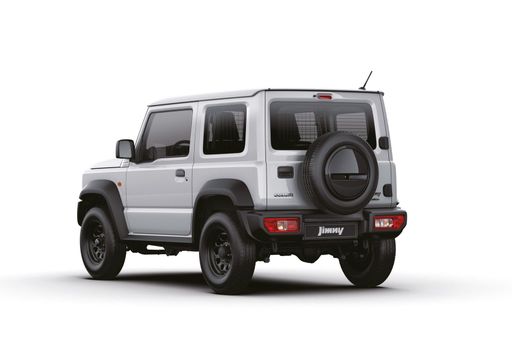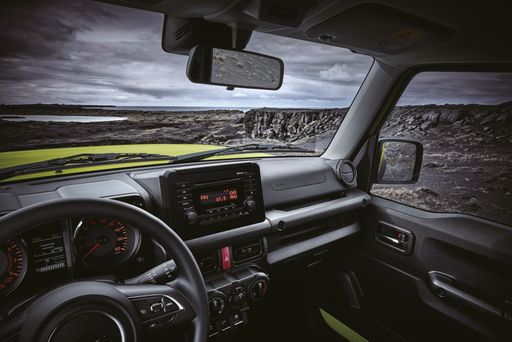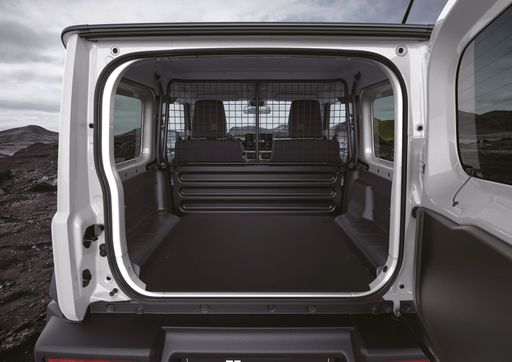Suzuki Jimny vs Maxus Deliver 9 – Differences & prices compared
Compare performance, boot space, consumption and price in one view.
Find out now: which car is the better choice for you – Suzuki Jimny or Maxus Deliver 9?
The Suzuki Jimny (Off-Roader) comes with a Petrol engine and Manuel transmission. In comparison, the Maxus Deliver 9 (Cargo Van) features a Diesel or Electric engine with Manuel or Automatic transmission.
When it comes to boot capacity, the Suzuki Jimny offers , while the Maxus Deliver 9 provides – depending on how much space you need. If you’re looking for more power, decide whether the 102 HP of the Suzuki Jimny or the 204 HP of the Maxus Deliver 9 suits your needs better.
In terms of consumption, the values are 7.70 L per 100 km for the Suzuki Jimny, and 26.20 kWh8.80 L for the Maxus Deliver 9.
Price-wise, the Suzuki Jimny starts at 25300 £, while the Maxus Deliver 9 is available from 38700 £. Compare all the details and find out which model fits your lifestyle best!
Suzuki Jimny
The Suzuki Jimny is a compact SUV that has gained a loyal following for its rugged charm and off-road capabilities. Its boxy design is both nostalgic and functional, making it stand out in a sea of more streamlined vehicles. Despite its small size, the Jimny offers a surprisingly robust driving experience, ideal for adventurous journeys off the beaten track.
details @ suzuki.at
@ suzuki.at
 @ suzuki.at
@ suzuki.at
 @ suzuki.at
@ suzuki.at
 @ suzuki.at
@ suzuki.at
Maxus Deliver 9
The Maxus Deliver 9 presents itself as a robust and versatile vehicle, perfectly suited for both urban and rural deliveries. With a spacious cargo area and a modern cabin equipped with advanced technology, it caters to the needs of both driver comfort and logistical efficiency. Its sleek design and reliable performance make it an attractive option for businesses looking to upgrade their fleet.
details

|
|
|
|
|
Costs and Consumption |
|
|---|---|
|
Price
25300 - 27700 £
|
Price
38700 - 60200 £
|
|
Consumption L/100km
7.70 L
|
Consumption L/100km
8.80 L
|
|
Consumption kWh/100km
-
|
Consumption kWh/100km
26.2 - 30.8 kWh
|
|
Electric Range
-
|
Electric Range
287 - 358 km
|
|
Battery Capacity
-
|
Battery Capacity
-
|
|
co2
173 g/km
|
co2
0 - 231 g/km
|
|
Fuel tank capacity
40 L
|
Fuel tank capacity
-
|
Dimensions and Body |
|
|---|---|
|
Body Type
Off-Roader
|
Body Type
Cargo Van
|
|
Seats
2
|
Seats
3 - 7
|
|
Doors
3
|
Doors
4
|
|
Curb weight
1165 kg
|
Curb weight
2360 - 2770 kg
|
|
Trunk capacity
-
|
Trunk capacity
-
|
|
Length
3645 mm
|
Length
5546 - 5940 mm
|
|
Width
1645 mm
|
Width
2062 mm
|
|
Height
1705 mm
|
Height
2525 - 2755 mm
|
|
Payload
270 kg
|
Payload
730 - 1140 kg
|
Engine and Performance |
|
|---|---|
|
Engine Type
Petrol
|
Engine Type
Diesel, Electric
|
|
Transmission
Manuel
|
Transmission
Manuel, Automatic
|
|
Transmission Detail
Manual Gearbox
|
Transmission Detail
Manual Gearbox, Reduction Gearbox
|
|
Drive Type
All-Wheel Drive
|
Drive Type
Front-Wheel Drive
|
|
Power HP
102 HP
|
Power HP
148 - 204 HP
|
|
Acceleration 0-100km/h
12.80 s
|
Acceleration 0-100km/h
16 - 19 s
|
|
Max Speed
145 km/h
|
Max Speed
100 - 160 km/h
|
|
Torque
130 Nm
|
Torque
330 - 375 Nm
|
|
Number of Cylinders
4
|
Number of Cylinders
4
|
|
Power kW
75 kW
|
Power kW
108 - 150 kW
|
|
Engine capacity
1462 cm3
|
Engine capacity
1996 cm3
|
General |
|
|---|---|
|
Model Year
2021 - 2024
|
Model Year
2022 - 2024
|
|
CO2 Efficiency Class
F
|
CO2 Efficiency Class
G, A
|
|
Brand
Suzuki
|
Brand
Maxus
|
Suzuki Jimny
Revamping Tradition with Modern Twists: The Suzuki Jimny
The Suzuki Jimny continues its legacy as a robust compact off-roader, seamlessly blending its iconic design with modern technological advancements. Whether traversing rugged terrains or cruising urban streets, the Jimny stands out as a versatile companion.
A Legacy Reimagined: Design and Build
Suzuki stays true to its roots with the Jimny's classic square silhouette. This three-door compact SUV is not just about aesthetics; its dimensions—with a length of 3645 mm, a width of 1645 mm, and a height of 1705 mm—are designed to tackle off-road challenges effortlessly. With its compact build, the Jimny fits snugly into city parking spots whilst still radiating an aura of toughness.
The Heart of the Machine: Engine and Performance
Powered by a 1.5-litre four-cylinder engine, the Jimny delivers 102 PS and 130 Nm of torque. Its petrol engine is paired with a manual transmission, offering drivers a more connected and tactile driving experience. With a fuel consumption of 7.7 L/100km, it strives to balance power and efficiency. The Jimny's maximum speed peaks at 145 km/h, while it accelerates from 0 to 100 km/h in 12.8 seconds, a testament to its steadfast performance in its category.
Mastering Terrains with ALLGRIP PRO
One of the standout features of the Jimny is its ALLGRIP PRO all-wheel-drive system, designed for serious off-roaders. This technology provides the driver with the ability to switch between 2WD and 4WD at the flick of a switch, ensuring maximum traction no matter the condition. The elevation of its chassis and its tough underbody protection mean the Jimny can handle rough landscapes with relative ease.
Comfort Meets Functionality: Interior Features
Step inside, and you'll find an interior that perfectly balances utility and comfort. The Jimny might be a two-seater, but its thoughtful design ensures ample space for both driver and passenger. The dashboard is simple yet functional, equipped with essential features that accentuate the driving experience without unnecessary distractions.
The Green Concerns: Environmental Impact
While the Jimny offers impressive off-road capabilities, its CO2 emissions stand at 173 g/km, placing it within efficiency class F. This is an area where environmentally conscious buyers might seek further innovation from Suzuki. Despite this, the Jimny remains a preferable choice for those who value performance over emission metrics.
Balancing Act: Cost and Affordability
Priced between €29,490 and €32,340, the Jimny positions itself within a competitive market segment. Potential owners will be making a modest investment for a vehicle that promises both durability and versatility. With monthly costs estimated at €940 and €0.376 per kilometre, it remains an affordable option for those who prioritise capability over luxury.
In Conclusion: A Symbol of Reliability
The Suzuki Jimny is more than just a car; it’s a lifestyle choice for adventurers who refuse to conform to the ordinary. With years of trust behind it, the Jimny has successfully adapted to the needs of the modern driver without compromising its rugged essence. Whether you're scaling new heights or navigating city landscapes, the Jimny proves itself a worthy companion on any road less travelled.
Maxus Deliver 9
A Versatile Workhorse: The Maxus Deliver 9
The Maxus Deliver 9 is rapidly gaining traction in the commercial vehicle sector. As a versatile and capable van, it meets the needs of a range of industries, providing both diesel and electric powertrains. The model year updates from 2020 to 2023 bring a host of technical advancements and innovative features that make the Maxus Deliver 9 stand out in its class.
Powertrain Options: Diesel and Electric
The Maxus Deliver 9 offers a choice between traditional diesel and modern electric powertrains. The diesel variant comes with a 2.0-litre engine, delivering 148 PS and a torque of 310 Nm. It is available with both front and rear-wheel drive configurations, coupled with a manual gearbox. These options provide robust and reliable performance for traditionalists who favour a dependable diesel setup.
For those looking to the future, the electric eDeliver 9 offers compelling specifications. With a power output of 204 PS and torque reaching 375 Nm, the electric version provides a silent and efficient drive. Battery capacity options cater to different needs, with ranges spanning from 265 km to an impressive 328 km depending on the chosen battery configuration. This makes the eDeliver 9 a viable choice for urban and regional deliveries.
Innovative Features for Enhanced Utility
The Maxus Deliver 9 is equipped with features designed to enhance practicality and comfort. With a payload capacity ranging from 630 to 1275 kg, it is well-suited for various commercial applications. The model’s dimensions and configurable seating options (accommodating between 3 to 7 passengers) add flexibility, making it ideal for both logistics and passenger transport roles.
Despite its work-focused design, the Deliver 9 doesn’t skimp on creature comforts. The cabin offers a modern infotainment system with touchscreen capabilities, providing intuitive control over navigation and connectivity functions. Advanced safety features, including lane departure warning and adaptive cruise control, are available, ensuring peace of mind for drivers and fleet managers alike.
Environmental and Economic Efficiency
In an era where sustainability is paramount, the Maxus Deliver 9 delivers low operating costs and reduced environmental impact, particularly in its electric form. The electric models boast zero tailpipe emissions and CO2 efficiency class ratings up to A, making them an attractive choice for green-conscious businesses.
From an economic standpoint, the electric variants also offer long-term savings through reduced fuel costs and maintenance requirements compared to their diesel counterparts. Initial pricing for the Deliver 9 ranges from €43,423 to €93,403, depending on the specification and powertrain, representing competitive value within the segment.
Conclusion: Meeting Modern Transport Needs
The Maxus Deliver 9 represents a compelling proposition in the commercial vehicle market. With its blend of diesel and electric powertrains, innovative features, and a focus on efficiency, it meets the diverse needs of modern businesses. Whether prioritising traditional power or embracing new technologies, the Deliver 9 offers a versatile choice that businesses can rely on for both present and future transportation needs.
Which drive types are available for the Suzuki Jimny?
Available as All-Wheel Drive.
The prices and data displayed are estimates based on German list prices and may vary by country. This information is not legally binding.
